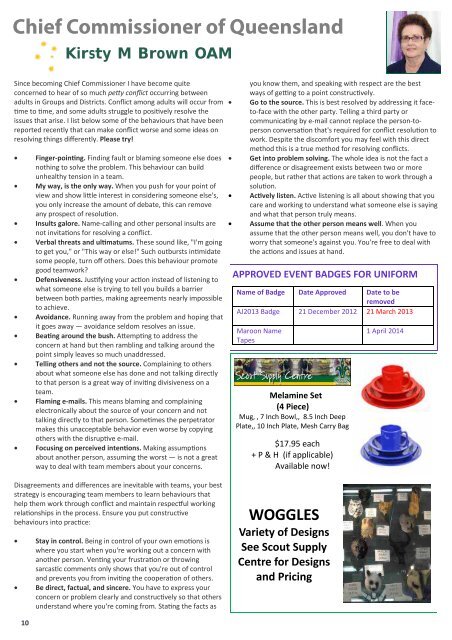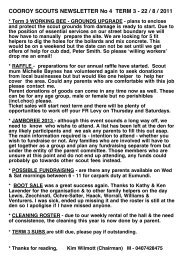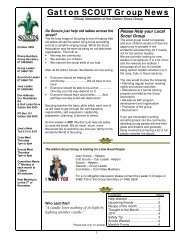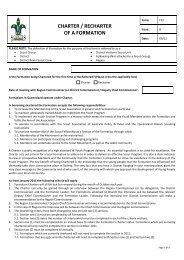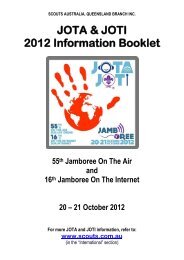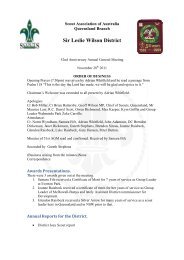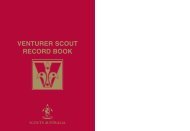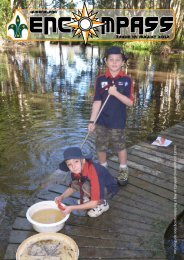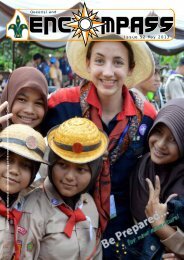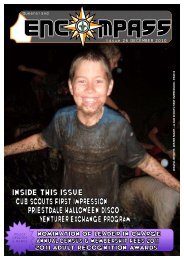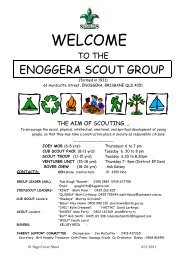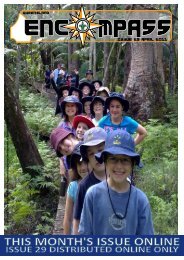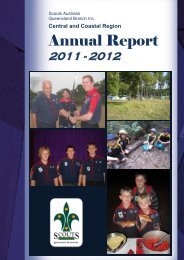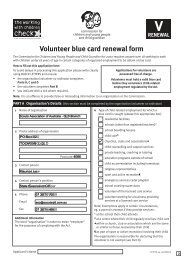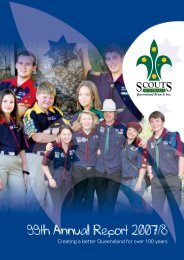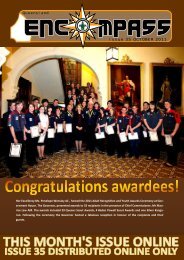Encompass Issue 50 â March 2013 - Kirwan Scout Group
Encompass Issue 50 â March 2013 - Kirwan Scout Group
Encompass Issue 50 â March 2013 - Kirwan Scout Group
Create successful ePaper yourself
Turn your PDF publications into a flip-book with our unique Google optimized e-Paper software.
Chief Commissioner of Queensland<br />
Kirsty M Brown OAM<br />
Since becoming Chief Commissioner I have become quite<br />
concerned to hear of so much pey conflict occurring between<br />
adults in <strong>Group</strong>s and Districts. Conflict among adults will occur from<br />
me to me, and some adults struggle to posively resolve the<br />
issues that arise. I list below some of the behaviours that have been<br />
reported recently that can make conflict worse and some ideas on<br />
resolving things differently. Please try!<br />
• Finger-poinng. Finding fault or blaming someone else does<br />
nothing to solve the problem. This behaviour can build<br />
unhealthy tension in a team.<br />
• My way, is the only way. When you push for your point of<br />
view and show lile interest in considering someone else's,<br />
you only increase the amount of debate, this can remove<br />
any prospect of resoluon.<br />
• Insults galore. Name-calling and other personal insults are<br />
not invitaons for resolving a conflict.<br />
• Verbal threats and ulmatums. These sound like, "I'm going<br />
to get you," or "This way or else!" Such outbursts inmidate<br />
some people, turn off others. Does this behaviour promote<br />
good teamwork?<br />
• Defensiveness. Jusfying your acon instead of listening to<br />
what someone else is trying to tell you builds a barrier<br />
between both pares, making agreements nearly impossible<br />
to achieve.<br />
• Avoidance. Running away from the problem and hoping that<br />
it goes away — avoidance seldom resolves an issue.<br />
• Beang around the bush. Aempng to address the<br />
concern at hand but then rambling and talking around the<br />
point simply leaves so much unaddressed.<br />
• Telling others and not the source. Complaining to others<br />
about what someone else has done and not talking directly<br />
to that person is a great way of inving divisiveness on a<br />
team.<br />
• Flaming e-mails. This means blaming and complaining<br />
electronically about the source of your concern and not<br />
talking directly to that person. Somemes the perpetrator<br />
makes this unacceptable behavior even worse by copying<br />
others with the disrupve e-mail.<br />
• Focusing on perceived intenons. Making assumpons<br />
about another person, assuming the worst — is not a great<br />
way to deal with team members about your concerns.<br />
you know them, and speaking with respect are the best<br />
ways of geng to a point construcvely.<br />
• Go to the source. This is best resolved by addressing it faceto-face<br />
with the other party. Telling a third party or<br />
communicang by e-mail cannot replace the person-toperson<br />
conversaon that's required for conflict resoluon to<br />
work. Despite the discomfort you may feel with this direct<br />
method this is a true method for resolving conflicts.<br />
• Get into problem solving. The whole idea is not the fact a<br />
difference or disagreement exists between two or more<br />
people, but rather that acons are taken to work through a<br />
soluon.<br />
• Acvely listen. Acve listening is all about showing that you<br />
care and working to understand what someone else is saying<br />
and what that person truly means.<br />
• Assume that the other person means well. When you<br />
assume that the other person means well, you don't have to<br />
worry that someone's against you. You're free to deal with<br />
the acons and issues at hand.<br />
APPROVED EVENT BADGES FOR UNIFORM<br />
Name of Badge Date Approved Date to be<br />
removed<br />
AJ<strong>2013</strong> Badge 21 December 2012 21 <strong>March</strong> <strong>2013</strong><br />
Maroon Name<br />
Tapes<br />
Melamine Set<br />
(4 Piece)<br />
Mug, , 7 Inch Bowl,, 8.5 Inch Deep<br />
Plate,, 10 Inch Plate, Mesh Carry Bag<br />
$17.95 each<br />
+ P & H (if applicable)<br />
Available now!<br />
1 April 2014<br />
Disagreements and differences are inevitable with teams, your best<br />
strategy is encouraging team members to learn behaviours that<br />
help them work through conflict and maintain respecul working<br />
relaonships in the process. Ensure you put construcve<br />
behaviours into pracce:<br />
• Stay in control. Being in control of your own emoons is<br />
where you start when you're working out a concern with<br />
another person. Venng your frustraon or throwing<br />
sarcasc comments only shows that you're out of control<br />
and prevents you from inving the cooperaon of others.<br />
• Be direct, factual, and sincere. You have to express your<br />
concern or problem clearly and construcvely so that others<br />
understand where you're coming from. Stang the facts as<br />
WOGGLES<br />
Variety of Designs<br />
See <strong>Scout</strong> Supply<br />
Centre for Designs<br />
and Pricing<br />
10


